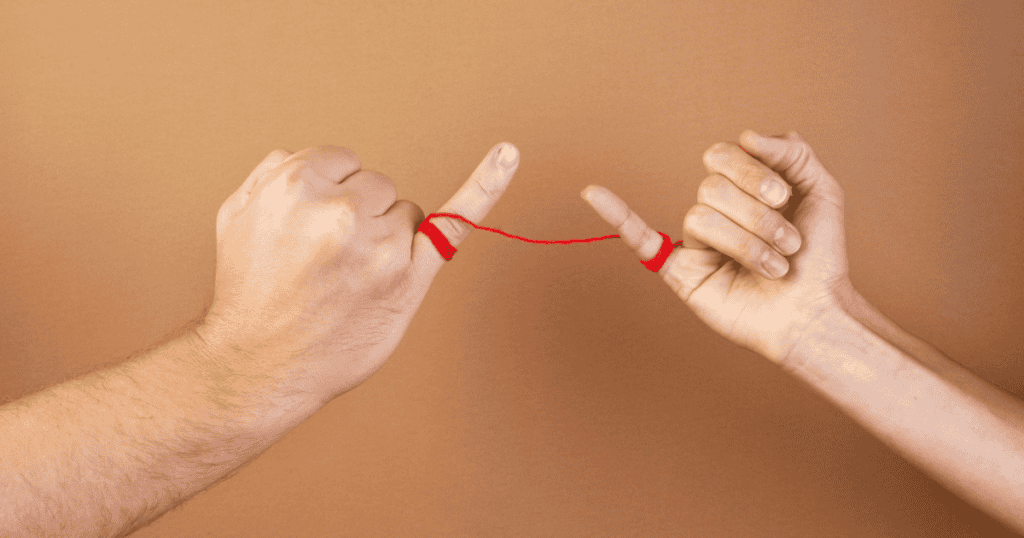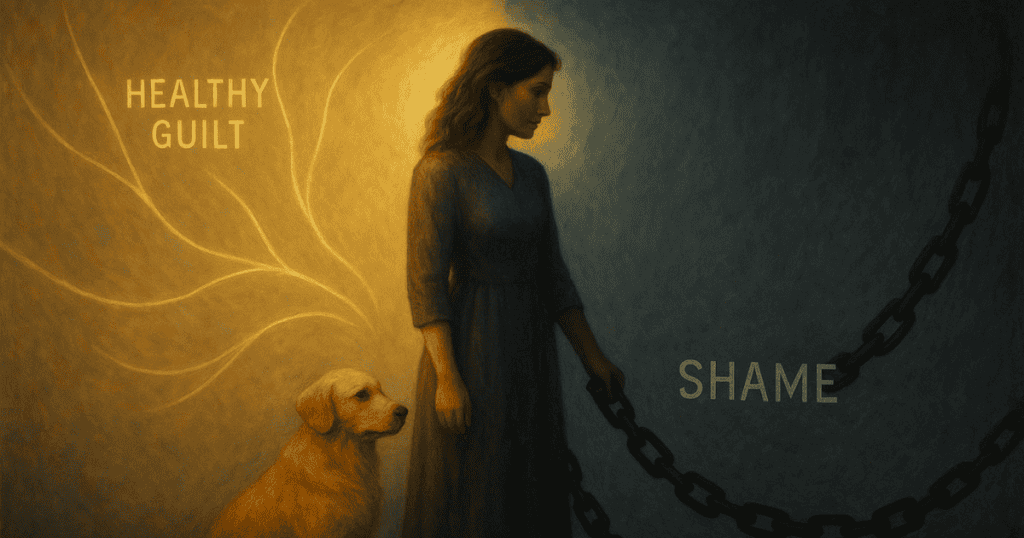Guilt was my default setting, not because I kept doing wrong, but because narcissists made me believe existing was a crime.
I once told my mother I couldn’t drive her to the store because I had an early work deadline.
The silence that followed was worse than yelling.
I felt her disappointment like a weight pressing down on my chest.
By the time I hung up, I was already rehearsing how to make it up to her, as if working for my own future was a betrayal.
It wasn’t just her.
My younger brother would guilt me for not handing over my allowance when he “needed” it.
My sister accused me of being cold whenever I set a boundary.
Even my aunt joined in, reminding me that “family comes first,” which really meant “your needs come last.”
For years, guilt was my leash.
But the truth is, survivors of narcissists struggle to tell the difference between guilt that makes you grow and guilt that keeps you trapped.
This article shows how to separate the two.
Table of Contents
5 Core Differences Between Healthy and Unhealthy Guilt

Survivors of narcissistic abuse often confuse normal accountability with toxic guilt.
Narcissists exploit your empathy, twisting your natural conscience into a tool of control.
Yet there’s a critical difference.
Healthy guilt strengthens integrity, while unhealthy guilt strips you of yourself.
Healthy Guilt Makes You Take Responsibility, Unhealthy Guilt Makes You Abandon Yourself
Healthy guilt is corrective.
If I spoke sharply to my dad after a stressful day, guilt pushed me to apologize and reconnect.
That guilt had a purpose.
It repaired love and strengthened the bond we already valued. It reminded me I could stumble without losing myself.
Unhealthy guilt, though, demanded I abandon myself.
When my toxic sister complained that I “never do enough” after I’d already helped her with errands, I felt guilty for saying no.
I hadn’t wronged her. I’d simply chosen myself.
But unhealthy guilt twisted the moment into betrayal, making me feel selfish for having limits at all.
Healthy Guilt Pushes You to Fix the Situation, Unhealthy Guilt Makes You Carry Their Comfort

Healthy guilt motivates you to clean up genuine harm.
If I forgot to check in with a cousin who had supported me, guilt nudged me to make it right.
That kind of guilt fosters accountability, deepens trust, and strengthens healthy connections.
It calls you back when you’ve unintentionally neglected someone you truly value.
But unhealthy guilt convinced me I had to carry everyone’s moods.
Like the time my narcissistic brother sulked for hours because I didn’t lend him money.
I caved, not because I believed I’d done wrong, but because guilt convinced me it was my job to fix his storm.
Narcissists weaponize guilt to make their comfort your lifelong assignment.
You end up exhausting yourself patching up feelings that never should have been yours to manage in the first place.
Healthy Guilt Calls You Toward Honesty, Unhealthy Guilt Forces You Into People-Pleasing
Healthy guilt demands truth.
It calls you to admit mistakes openly and stand in integrity.
It helps you own your actions without fear, teaching you that accountability and self-respect can coexist.
But unhealthy guilt made me a chameleon.
At family dinners, my toxic sibling would twist my choices into punchlines, mocking me for being “too independent” or “too busy for family.”
Instead of calmly holding my ground, I’d laugh along, apologize for missing gatherings, and promise to show up more.
That wasn’t honesty. It was people-pleasing under duress, guilt disguised as compliance.
Over time, I realized this form of guilt wasn’t about repairing relationships.
It was about silencing myself so others could stay comfortable, even at the expense of my authenticity.
Healthy Guilt Feels Like Growth, Unhealthy Guilt Feels Like You’ll Never Be Enough

When guilt is healthy, it’s uncomfortable but finite.
Like when I forgot my husband’s work milestone, the guilt pushed me to show up better.
It felt heavy in the moment, but it eventually lifted because action repaired the bond.
Healthy guilt teaches you, then releases you. But unhealthy guilt is endless.
With my toxic mom, no matter how much I did, it was never enough.
Cook dinner? She’d critique the seasoning.
Arrive early? She’d sigh because I didn’t stay late.
Even when I gave more than I had, the goalposts shifted again.
Unhealthy guilt doesn’t resolve. It multiplies.
It convinces you you’re permanently indebted and forever inadequate, no matter how much you sacrifice.
Healthy Guilt Builds Your Character, Unhealthy Guilt Erodes Your Identity
Healthy guilt aligns you with your values. It keeps you honest, humble, and human.
By reminding you where you’ve fallen short, it pushes you to grow stronger and live closer to the principles you truly care about.
In this way, guilt becomes a sculptor, refining your character over time.
Unhealthy guilt, though, slowly dissolves your identity.
I spent years unsure of what I even liked, because every decision was measured against whether my narcissistic family would approve.
My own desires were drowned out by their disapproval.
That’s the final price of unhealthy guilt.
You stop existing as yourself and begin living as a shadow of who they need you to be.
How Narcissistic Abuse Warps Your Guilt Reflex

Living under narcissistic dynamics rewires your nervous system.
You stop evaluating situations logically and instead flinch at the thought of disappointing someone.
It becomes less about what’s right and more about what will keep the peace.
Your body learns to anticipate explosions before they even happen.
When my self-absorbed brother slammed doors because I didn’t give him what he wanted, I didn’t ask, “Is this manipulative?”
Instead, I asked, “What did I do wrong?”
When my sister exploded at me for setting a boundary, I spiraled in guilt.
Even silence from my mother felt like punishment, because I had been conditioned to read it as rejection.
Over time, guilt became automatic.
Not because I was guilty, but because I was trained to believe independence equaled betrayal.
Narcissists hijack your conscience, replacing your inner compass with their demands.
That guilt reflex isn’t weakness. It’s conditioning.
Recognizing it is the first step toward breaking it.
The reflex is proof of manipulation, not proof of your unworthiness.
Relearning Which Guilt to Trust

Once you understand the difference between healthy and unhealthy guilt, you need tools to test guilt in real time.
Here’s how I learned to separate mine from theirs:
Ask Who Benefits From Your Guilt
Does this guilt help me grow as a person, or does it just keep them in power?
When guilt benefits the relationship or my values, it’s mine.
When it only keeps the narcissist comfortable, it’s not.
Healthy guilt invests in connection, while unhealthy guilt invests in control.
An example of this is when my dad once reminded me that I forgot to update him about a doctor’s appointment.
The guilt pushed me to communicate better.
That was mine. It deepened trust.
But when my mother scolds me for not picking up her groceries, despite her having other options?
That guilt only gave her control.
It didn’t improve me or our relationship. It simply reinforced her expectation that my life revolved around hers.
Test It Against Reality, Not Their Reaction

Did I actually harm someone, or am I just reacting to their disappointment?
The distinction is everything.
Narcissists thrive on blurring that line, making their irritation feel like proof of your wrongdoing.
My mother used to glare at me for not answering calls instantly.
The guilt was intense, like I had abandoned her.
But when I tested it against reality, the truth was I wasn’t harming her.
I was living my life, sometimes working, sometimes resting, sometimes simply unavailable.
Narcissists use reactions to fabricate guilt.
Testing reality cuts the cord and forces you to see that a reaction is not the same as harm.
It’s their tactic, not your truth.
Anchor Back to Your Values
Healthy guilt pushes you toward the person you want to become.
Unhealthy guilt pushes you into smallness.
Values act like a compass. If guilt aligns with them, it’s worth listening to.
If it only serves someone else’s control, it’s noise.
Now, when guilt surfaces, I ask, “Is this guiding me closer to honesty, kindness, or self-respect?”
If yes, I listen.
If it just makes me shrink into silence, I let it go.
For example, when my toxic sister accused me of being “selfish” for not dropping everything to help her move, I measured it against my values.
I was already honoring honesty and self-respect by saying no.
That guilt wasn’t mine.
For the “chess-player brain” survivor, here are quick tactical questions to break the spell:
- Ownership Test → Did I cause actual harm, or am I just afraid of their reaction?
- Benefit Test → Does this guilt make me a better person, or does it only serve their control?
- Value Test → Does this guilt align with my core values, or does it make me abandon them?
If guilt fails these tests, it’s not yours. Drop it.
The Day I Stopped Carrying Narcissists’ Guilt as My Own

One Christmas, I found myself alone in the kitchen, scrubbing dishes while everyone else laughed in the living room.
I was there because my mother had sighed, my overbearing sister had complained, and my toxic brother had sulked.
And I felt guilty for not doing more.
But as I looked at the sink overflowing with suds, it hit me: this chaos wasn’t mine to clean, not literally and not emotionally.
I hadn’t caused my narcissistic family’s dysfunction. I had just been trained to mop it up.
That was the day I stopped carrying guilt that wasn’t mine.
Healthy guilt makes me accountable.
Narcissists’ guilt made me obedient.
I don’t live obediently anymore. I live free.
Related posts:
- 8 Elegant Yet Brutal Phrases Smart Women Use to Neutralize Narcissistic Guilt Trips
- How I Stopped Feeling Guilty After Cutting Off My Narcissistic Family (And Why It Was Extremely Critical For Moving Forward)
- The #1 Narcissist Mind Game That Leaves You Feeling Crazy, Powerless, and Guilty
- 13 Tips on How I Deal With My Narcissistic Mother Guilt Trip
- 8 Unspoken Rules Every Narcissist Lives By (And How They Enforce Them on You)


